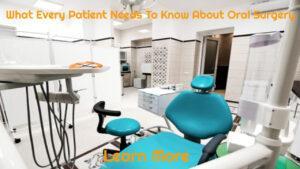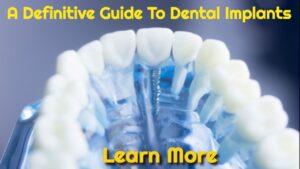Oral Surgery Procedures – Solutions for Oral Issues
According to the most recent medical studies, an estimated 63 per cent of Americans visit the dentist at least once every year. Many people do it significantly more frequently. While some people receive preventative care, others require more extensive treatment, which includes dental surgery for millions of people. If you or a loved one is about to have oral surgery, the procedure might be daunting. Increased awareness, on the other hand, will help to reduce those worries. As a result, it’s critical to comprehend the broad notion of this form of treatment as well as the fundamentals of several common oral surgical treatments.
What is Oral Surgery?
Oral surgery, in a nutshell, refers to a variety of treatments performed on the teeth, gums, jawbones, and other structures within the mouth. They are commonly performed by periodontists or oral and maxillofacial surgeons. These operations can help cure dental disorders and jaw alignment concerns, as well as restore damage caused by injuries, medical conditions, and certain medications. According to current polls, five to ten million Americans require oral surgery each year. Furthermore, certain research reveals that these types of operations are becoming more common.
Examining the Different Types of Oral Surgeries
The term “oral surgery” refers to a wide range of procedures. Some take only a few minutes to complete, while others may take longer. Some of these procedures, however, are more intrusive than others. Examine some of the most popular dental surgery procedures to gain a better understanding of what these forms of therapy may entail.
Extracting Teeth Surgically
Every year, tens of thousands of people have their teeth pulled. A simple extraction is a rapid, easy process for extracting teeth. During these operations, dentists pull broken or rotting teeth that need to be extracted. But things aren’t usually that simple. Teeth are sometimes too damaged to endure the pressure of being pulled. Some people’s teeth have broken off below the gum line, and the dentist doesn’t have enough material to grab for a traditional extraction. In some cases, the surgeon will need to make incisions in the gums and surgically remove the tooth.
Periodontal Disease Treatment in Depth
Another type of oral surgery performed by oral surgeons is periodontal surgery. Surgeons may need to make incisions in the gums and push soft tissue away from the tooth roots. Oral surgeons can clean the roots of the teeth and remove any bacteria accumulation that may be present by pushing the soft tissue away from the teeth’s bases. The gum tissue is then sutured and allowed to recover. Again, gum disease oral surgery can help treat infections and avoid subsequent problems.
Dental Implant Surgery
More than three million people have had dental implants inserted, with another 500,000 getting them every year. Dental implants are one of the most popular tooth replacement options. It is a viable alternative to less permanent solutions such as dentures. Implanting dental implants is a lengthy procedure that begins with oral surgery.
An oral surgeon creates incisions in the gum tissue and inserts rods into the jawbones during the first stage of implant implantation. These rods will eventually be linked to fake teeth called crowns and will extend from the bone through the gum tissue. The surgeon will stitch the gum tissue after placing these rods composed of biologically suitable titanium. Following that, the gums will recover and the jawbones will connect to the implants. The crowns will next be connected to the rods.
Bone Transplants
Some people require dental bone grafts to restore jaw strength. However, infections, extensive gum disease, missing teeth, and other factors can cause jawbone deterioration. When this occurs, dental practitioners may propose a bone graft to restore the jawbone’s health. The oral surgeon will rebuild the patient’s jawbone with bone material from their hip or leg. Bone graft surgery can be used to prevent tooth loss or to create a strong foundation for implants.
Repair of Cleft Lip and Palate
Cleft lip and palate repairs are also performed by oral surgeons. This problem develops when the lip or palate do not grow normally before birth. This illness affects less than 1% of babies in the United States, but it is more frequent in some other nations. It can impair a child’s ability to speak and eat correctly, and in certain circumstances, it can create breathing problems. These issues can be corrected by oral surgeons.
Effective Treatments for Oral Issues
 These are the most prevalent types of oral operations. Of course, not all surgeries are the same, but they can treat and even reverse oral and maxillofacial disorders. Oral surgeons utilise anaesthetics to numb the affected area prior to the procedure, and sedation is usually given for people who have more severe surgical phobias. Though most patients have post-operative discomfort, it is usually brief, and patients can alleviate it with prescription and over-the-counter pain relievers and anti-inflammatory drugs.
These are the most prevalent types of oral operations. Of course, not all surgeries are the same, but they can treat and even reverse oral and maxillofacial disorders. Oral surgeons utilise anaesthetics to numb the affected area prior to the procedure, and sedation is usually given for people who have more severe surgical phobias. Though most patients have post-operative discomfort, it is usually brief, and patients can alleviate it with prescription and over-the-counter pain relievers and anti-inflammatory drugs.
Brought To You By: https://www.starbritedentalrockville.com/oral-surgeon-rockville-md
The post Taking A Closer Look At Oral Surgery And Various Procedures appeared first on https://arquiaca.org
The post Taking A Closer Look At Oral Surgery And Various Procedures appeared first on https://wookicentral.com
The post Taking A Closer Look At Oral Surgery And Various Procedures appeared first on https://gqcentral.co.uk
The post Taking A Closer Look At Oral Surgery And Various Procedures appeared first on https://alef3.com







Comments are closed